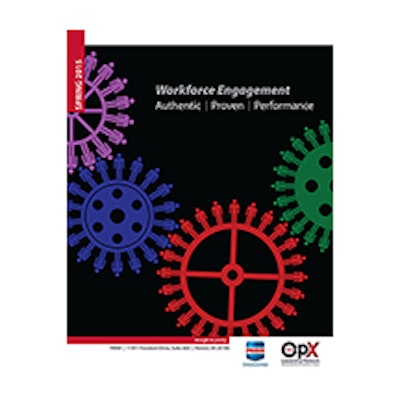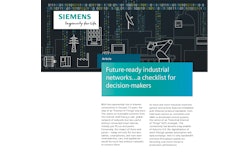According to research from the Pew Center, 2015 marked the first time that those born after 1980, otherwise known as “millennials,” made up the largest segment of the U.S. workforce. Employers are already facing both opportunities and challenges as they seek to engage and retain talent. What once served as workplace incentives to baby boomers and Generation X will require readjustment to leverage worker interests and skills.
Prevailing misconceptions surrounding industrial occupations present an even greater challenge for manufacturing. Educating today’s workforce, and generations to come, is crucial in today’s fast and highly competitive marketplace. The good news is that there are initiatives to provide young workers with enthusiasm for the industry.
In 2015, the Workforce Develop-ment Solutions Group from the OpX Leadership Network, convened by PMMI, the Association for Packaging and Processing Technologies, released a report on Workforce Engagement offering an industry insider perspective on today’s workforce and potential strategies for improvement. The document zeroes in on increasing engagement to ensure young manufacturing workers feel invested in a company’s success. Disengaged employees in the U.S. cost an estimated $450 to $550 billion in lost productivity, according to a 2013 Gallup report on the State of the American Workplace.
After more than a quarter-century in training and development at Kraft Nabisco, Nancy Cobb, President and Owner of Partners in Possibilities, Inc., sees a different mindset in today’s young workers.
“Millennials have an entirely different expectation from their employers compared to previous groups,” says Cobb. “Within the past decade, young workers have become much more concerned about the organization’s purpose, and how the culture lines up with their values and expectations—especially when deciding whether to stay with that organization.”
Greg Flickinger, Ph.D., Vice President of Manufacturing and Corporate Engineering, Snyder’s-Lance, and chair of the OpX Leadership Network’s Workforce Development Solutions Group, notes that there has been a generational shift regarding workplace expectations.
“Millennials are much less willing to compromise, and they will take action to either change the work environment they’re in or find a place that fulfills their expectations,” Flickinger says. “Previous generations looked at work as tasks. Today’s workforce looks at work as an opportunity for fulfillment.”
Although pay and financial benefits are an important factor when millennials consider where they want to work, purpose and advancement are key influencers in choosing between similar companies.
“They believe if they have a necessary skill to get the job done, and can demonstrate the ability and maturity to handle it, the time of service at an organization is almost irrelevant,” says Jill Costelow, vice president of operations and supply chain at Pressed Juicery. As a result, Costelow notes that Pressed Juicery has a skill-based performance and pay system.
When an organization clearly communicates a purpose to staff and offers opportunities to grow within the company, it supports a sense of collaboration and accomplishment.
Not your father’s factory floor
In an effort to reach learners as early as possible, it is important for manufacturers to collaborate more closely and extensively with schools and colleges. “Part of the problem is that for the past 30 years or so, the public perception of manufacturing has been very grim,” says Patricia Andersen, director of human resources for Delkor and chair of PMMI’s Education & Workforce Development Committee. “It has been viewed as a repetitive and dead-end job, which has resulted in many young people ignoring a career path in manufacturing.”
In fact, Anderson is quick to note that while unemployment as a whole rose in the past decade, jobs in manufacturing remain unfilled and perception is one of the main reasons. She cites programs such as Project Lead the Way, First Robotics, and Vex Robotics as examples meant to create excitement and connect students to a STEM (Science Technology Engineering and Math) curriculum. Manufacturing Day (MFG Day), officially held the first Friday in October, is a nationwide program addressing misconceptions about manufacturing. “In 2014, there were 400,000 participants all around the country in MFG Day. It is great that manufacturers have an opportunity to open their doors and showcase jobs for young people, and that we get to do so collectively to promote the public image of manufacturing,” says Andersen.
According to a 2015 Deloitte and the Manufacturing Institute study, 81 percent of students were more convinced manufacturing provides careers that are satisfying and rewarding as a result of Manufacturing Day, and 62 percent of students were more motivated to pursue a career in manufacturing. Educators also found MFG Day beneficial, as 93 percent were more likely to present manufacturing as an attractive and rewarding career choice.
PMMI’s Emerging Leaders Committee offers a number of initiatives and tools to engage the millennial workforce. Topics discussed in the network address identifying emerging leaders within a company, presenting processing and packaging as a high-tech profession rather than as a gritty factory job, and tactful looks at the communication methods of millennials versus baby boomers.
PMMI also provides opportunities at specific events that take place during PACK EXPO shows, where initiatives such as the Amazing Packaging Race and PACK Solutions Challenge are intended to connect college students with exhibitors at the show.
Finally, the OpX Leadership Network’s Workforce Development Solutions Group is completing work on a foundational diagnostic for the Engagement Framework. Essential elements are empowerment, enablement, and connection—universal principles across all industries. As with other OpX Leadership Network initiatives, the goal of the framework is to encourage young innovators to join the world of manufacturing. “As we continue to take the necessary steps, we can create meaningful work, purpose and recognition that engages the current and future workforce toward manufacturing,” concludes Flickinger.
To learn more about The OpX Leadership Network, visit www.opxleadershipnetwork.org. For more details on PMMI, see www.pmmi.org.


























